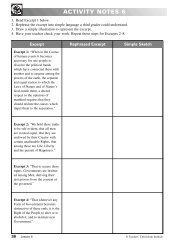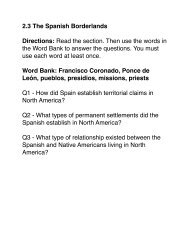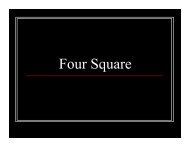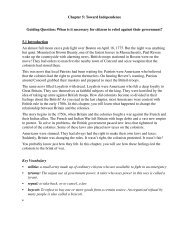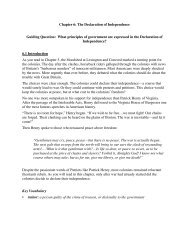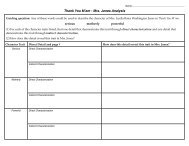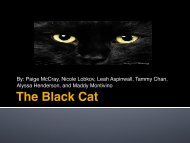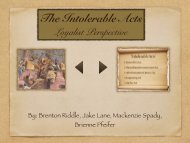- Page 1 and 2: History Alive! The United States St
- Page 3 and 4: environment affected these original
- Page 5 and 6: issues that divided the nation. Cha
- Page 7 and 8: These Abenaki children of New Engla
- Page 9 and 10: Page 4 Native American Cultural Reg
- Page 11 and 12: The California cultural region cont
- Page 13 and 14: perfect grazing for millions of buf
- Page 15 and 16: Scientists study these ways of life
- Page 17 and 18: (caption) At first, Spanish settler
- Page 19 and 20: The Coronado expedition continued n
- Page 21 and 22: “I marched some 20 paces ahead of
- Page 23 and 24: emained a prisoner—but a willing
- Page 25 and 26: The English based their claim to No
- Page 27 and 28: Government in the Colonies All the
- Page 29 and 30: Even in Massachusetts, not all Puri
- Page 31 and 32: Despite the Calverts’ efforts, Pr
- Page 33 and 34: In 1723, a tired teenager stepped o
- Page 35 and 36: which took place without bloodshed,
- Page 37 and 38: There, these goods were traded for
- Page 39 and 40: Men outnumbered women throughout th
- Page 41 and 42: Religion was very important to the
- Page 43 and 44: was greeted as a hero. The French a
- Page 45 and 46: look at, and he was a failure at bu
- Page 47 and 48: Tea Ships Arrive When the British E
- Page 49: The First Blow at Lexington In Apri
- Page 53 and 54: (caption) Thomas Paine’s pamphlet
- Page 55 and 56: Twelve of the signers had their hom
- Page 57 and 58: could be won by conquering a city o
- Page 59 and 60: (caption) With morale low and his s
- Page 61 and 62: Late that night, the British slippe
- Page 63 and 64: French? Explain. Page 100 7.8 The W
- Page 65 and 66: Page 104 8.2 Early Quarrels and Acc
- Page 67 and 68: Most of the delegates brought exten
- Page 69 and 70: Hugh Williamson Richard Dobbs Spaig
- Page 71 and 72: Page 111 8.7 Issue: How Should Slav
- Page 73 and 74: Page 114 8.10 Resolution: The Elect
- Page 75 and 76: shall or shall not be continued. Th
- Page 77 and 78: (vocabulary) popular sovereignty: t
- Page 79 and 80: y Congress. Removing the President
- Page 81 and 82: provide a lasting and stable framew
- Page 83 and 84: What does it symbolize? Page 131 Ch
- Page 85 and 86: medical treatment or vaccinations b
- Page 87 and 88: person who is tried for a crime and
- Page 89 and 90: excessive federal power. It says th
- Page 91 and 92: other countries. A Department of Wa
- Page 93 and 94: View of Human Nature Hamilton’s v
- Page 95 and 96: Jefferson had great faith in the go
- Page 97 and 98: (caption) John Adams, a Federalist,
- Page 99 and 100: (caption) Here, Republican women he
- Page 101 and 102:
George Washington (caption) George
- Page 103 and 104:
Page 165 12.6 What Happened: Jeffer
- Page 105 and 106:
that nothing remained of the presid
- Page 107 and 108:
president following Washington face
- Page 109 and 110:
North Carolina, they harvested thic
- Page 111 and 112:
also put many skilled craftspeople
- Page 113 and 114:
featured tall columns and fancy gar
- Page 115 and 116:
The presidential campaign of 1828 w
- Page 117 and 118:
But he did not have enough electora
- Page 119 and 120:
the right to nullify, or reject, fe
- Page 121 and 122:
Page 198 Geography Challenge The In
- Page 123 and 124:
American goods, farmers would have
- Page 125 and 126:
etween the two groups began to rise
- Page 127 and 128:
Lewis thought that many more Americ
- Page 129 and 130:
A month later, American forces led
- Page 131 and 132:
In the early 1800s, a number of exp
- Page 133 and 134:
The California Missions In 1769, a
- Page 135 and 136:
16.5 The Missionaries Ever since Le
- Page 137 and 138:
Page 226 And women did set things g
- Page 139 and 140:
fortune-making is over,” wrote a
- Page 141 and 142:
17.1 Introduction When the United S
- Page 143 and 144:
Cowboy Clothes and Gear From head t
- Page 145 and 146:
Their tables were frugally [simply]
- Page 147 and 148:
17.10 Mexicano Entertainments The C
- Page 149 and 150:
in frenzies. Like the First Great A
- Page 151 and 152:
But America still did not offer edu
- Page 153 and 154:
The Struggle Begins The organized m
- Page 155 and 156:
(caption) In 1998, Hilary Rodham Cl
- Page 157 and 158:
characteristic (vocabulary) segrega
- Page 159 and 160:
Slaves wore clothing made of coarse
- Page 161 and 162:
planter had a calm night’s rest,
- Page 163 and 164:
come. A black preacher wrote that:
- Page 165 and 166:
Graphic Organizer: Visual Metaphor
- Page 167 and 168:
question on which it ought to break
- Page 169 and 170:
produce such a war as I will not de
- Page 171 and 172:
invaders left Lawrence, one of them
- Page 173 and 174:
20.8 From Compromise to Crisis Duri
- Page 175 and 176:
addition, the compromise ended the
- Page 177 and 178:
Abraham Lincoln. Through even the d
- Page 179 and 180:
willing to do unpleasant work. Her
- Page 181 and 182:
Union and Confederate troops met on
- Page 183 and 184:
Mississippi to capture Baton Rouge
- Page 185 and 186:
manufacturing center. His army set
- Page 187 and 188:
22.1 Introduction By the end of the
- Page 189 and 190:
Fourteenth Amendment. This amendmen
- Page 191 and 192:
fulfillment of our pledge to the Ne
- Page 193 and 194:
Alabama, became a major iron-making
- Page 195 and 196:
visual metaphor to understand Afric
- Page 197 and 198:
the blood of white men upon the han
- Page 199 and 200:
their contents.” For the Plains I
- Page 201 and 202:
During the long drive, cowboys work
- Page 203 and 204:
Indian agents sold it to settlers i
- Page 205 and 206:
By the 1860s, many of the factors n
- Page 207 and 208:
often treated them like family. Gro
- Page 209 and 210:
top floors. Rents were cheaper high
- Page 211 and 212:
Sundays. To keep workers from claim
- Page 213 and 214:
flames.” Escaping workers rushed
- Page 215 and 216:
immigrants arrived at port cities,
- Page 217 and 218:
(caption) Italian immigrants often
- Page 219 and 220:
wrote, “Why do I have to sit in j
- Page 221 and 222:
Page 368 25.7 Closing the Immigrati
- Page 223 and 224:
Page 372 26.2 Andrew Carnegie and J
- Page 225 and 226:
(vocabulary) regulation: the enforc
- Page 227 and 228:
founded the Sierra Club, an organiz
- Page 229 and 230:
Page 381 26.10 Chapter Summary In t
- Page 231 and 232:
United States announced that Americ
- Page 233 and 234:
Page 388 27.4 The Philippines After
- Page 235 and 236:
Page 391 Geography Challenge U.S. E
- Page 237 and 238:
Wilson protested, Germany said that
- Page 239 and 240:
eparations was later set at $33 bil
- Page 241 and 242:
Graphic Organizer: Sensory Figures
- Page 243 and 244:
Congress limited immigration to the
- Page 245 and 246:
moving again. “Prosperity is just
- Page 247 and 248:
Agricultural Recovery Other recover
- Page 249 and 250:
The New Deal changed American attit
- Page 251 and 252:
weaker. In November 1942, more than
- Page 253 and 254:
which means “divine wind,” was
- Page 255 and 256:
public. (caption) American factorie
- Page 257 and 258:
Overcoming Injustice Despite the in
- Page 259 and 260:
Many Jewish Americans protested the
- Page 261 and 262:
from a backward rural nation into a
- Page 263 and 264:
Ratification of the NATO treaty was
- Page 265 and 266:
America. The Korean War The first m
- Page 267 and 268:
Page 445 Johnson used reports of a
- Page 269 and 270:
States and the free world had won t
- Page 271 and 272:
decision, the South segregated its
- Page 273 and 274:
Page 457 Crisis in Little Rock In 1
- Page 275 and 276:
There was chaos in the streets. Bus
- Page 277 and 278:
I just see things on a broader scal
- Page 279 and 280:
Good Times For many businesses and
- Page 281 and 282:
citizens. Page 471 account of event
- Page 283 and 284:
(caption) President Richard Nixon t
- Page 285 and 286:
elied much more on computer-guided
- Page 287 and 288:
In Congress, July 4, 1776 The unani
- Page 289 and 290:
For suspending our own Legislatures
- Page 291 and 292:
We the People of the United States,
- Page 293 and 294:
three days, nor to any other Place
- Page 295 and 296:
To make all Laws which shall be nec
- Page 297 and 298:
The President shall, at stated Time
- Page 299 and 300:
Section 3. New States may be admitt
- Page 301 and 302:
Amendment 5 Rights in criminal case
- Page 303 and 304:
The states and the people keep any
- Page 305 and 306:
ecomes valid as part of the Constit
- Page 307 and 308:
which this Article becomes operativ
- Page 309 and 310:
Page 499 Presidents of the United S
- Page 311 and 312:
Page 504 The World: Physical Page 5
- Page 313 and 314:
States of America conquistadors: Sp
- Page 315 and 316:
homesteader: a farmer who is given
- Page 317 and 318:
P Parliament: the lawmaking body of
- Page 319 and 320:
sit-in: a form of peaceful protest
- Page 321 and 322:
Algonquian, 13 alien, 153 Alien Act
- Page 323 and 324:
Black Hawk's War, 196 Black Muslims
- Page 325 and 326:
violence during, 459, 460 civil ser
- Page 327 and 328:
converts, 209 Coolidge, Calvin, 403
- Page 329 and 330:
election, presidential of 1800, 155
- Page 331 and 332:
G Gadsden Purchase, 212 Gage, Thoma
- Page 333 and 334:
iglu, 3 "I Have a Dream" (speech),
- Page 335 and 336:
L La Follette, Robert, 375 Land Ord
- Page 337 and 338:
Menéndez, Pedro, 23 Mennonites, 33
- Page 339 and 340:
Northwest Coast cultural region, 1m
- Page 341 and 342:
Penn, William, 43 Pennsylvania colo
- Page 343 and 344:
Reaganomics, 474 reaper, 179 recall
- Page 345 and 346:
Siberia, 2 silver mining, 234, 330
- Page 347 and 348:
Stowe, Harriet Beecher, 280, 281 st
- Page 349 and 350:
urbanization, 347 Utah, 279 V Valle
- Page 351 and 352:
Yeltsin, Boris, 448 Yorktown, Battl
- Page 353 and 354:
Granger Collection, New York; 152,
- Page 355 and 356:
Chapter 24 340, UNITE Archives, Khe



